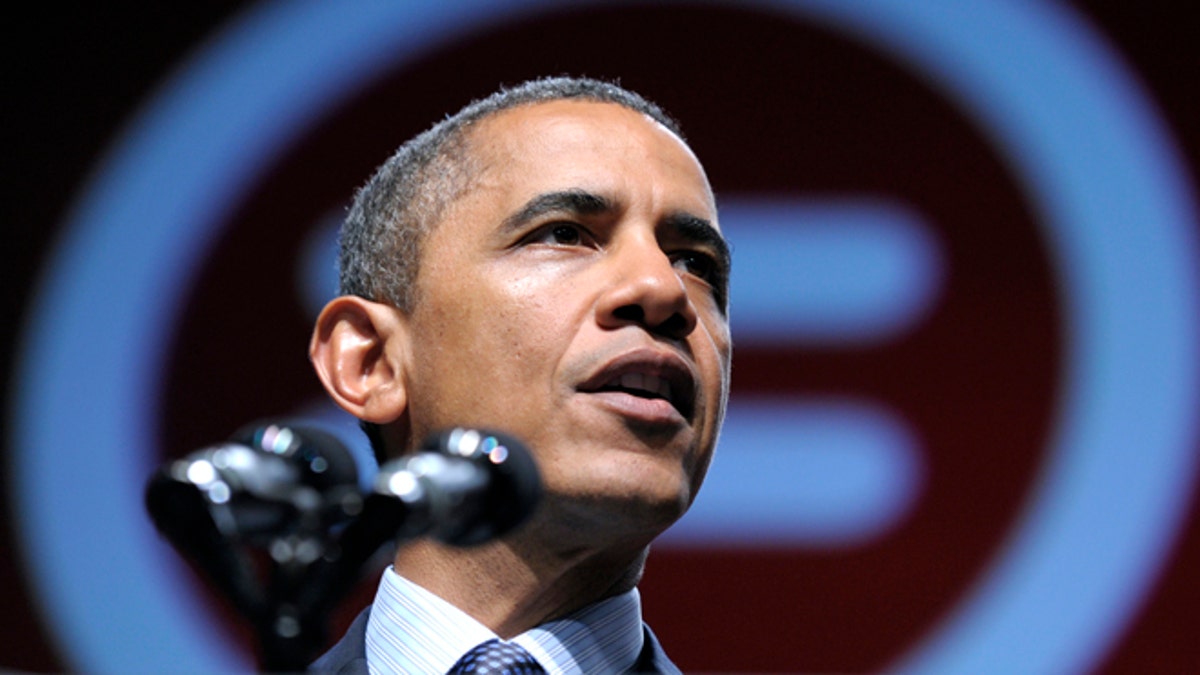
July 25, 2012: President Obama addresses the National Urban League convention in New Orleans. (AP)
As President Obama added his voice to the push for stricter gun rules in the wake of the Colorado movie theater massacre, the suggestion made a prompt thud on Capitol Hill when the top Senate Democrat said he can't fit the gun control debate in the schedule.
Senate Majority Leader Harry Reid, asked Thursday about Obama's remarks on gun control the night before, said the Senate's packed schedule precludes any action on firearms legislation. Asked if the Senate might debate the issue next year, Reid said, "Nice try."
The president was vague in what specific measures he'd like to see enacted when he touched on the issue Wednesday evening in a speech to the National Urban League. He affirmed his belief in Americans' right to own guns, but he singled out assault rifles as better suited for the battlefield.
"I believe the Second Amendment guarantees an individual the right to bear arms," Obama said. "But I also believe that a lot of gun owners would agree that AK-47s belong in the hands of soldiers, not on the streets of our cities."
He called for stepped-up background checks for people who want to purchase guns and said he would also seek a national consensus on combating violence.
White House Press Secretary Jay Carney clarified Thursday that the president is not necessarily talking about new laws.
"He believes that we can enhance the enforcement of existing laws by making it more difficult for those who should not have weapons under existing laws ... to obtain weapons," Carney said.
He noted that Obama supports the reinstatement of the assault weapons ban which expired in 2004, but said he wants to focus on strengthening background checks "given the stalemate in Congress."
The president, in making the comments Wednesday, still went further than he typically does in suggesting Washington open a new debate on gun control. It's a topic he has handled lightly in the past, but his remarks Wednesday night follow statements from vocal gun control advocates like New York City Mayor Michael Bloomberg calling for new restrictions.
Republicans, though, have largely said new laws are not the answer. Mitt Romney, pressed on the gun control issue in an NBC News interview during a visit to London, said changing laws won't "make all bad things go away."
"I don't happen to believe that America needs new gun laws. A lot of what this ... young man did was clearly against the law. But the fact that it was against the law did not prevent it from happening," he said.
James Holmes, a 24-year-old grad school dropout, is accused of opening fire in a midnight showing of the new Batman movie in Aurora, Colo., killing 12 and injuring dozens. Police say he used a shotgun, semi-automatic rifle and handgun in the shooting, and another handgun was found in his car -- all purchased legally, as was 6,000 rounds of ammunition.
Some political and media figures have argued that stricter gun laws would make it tougher for would-be gunman to carry out similar attacks, but others have accused gun control advocates of seeking to politicize the massacre.
Obama steered clear of gun policy matters in the immediate aftermath of the shooting, and it isn't clear whether he intends to push for such legislation any time soon, especially at the height of his re-election campaign.
The president, however, suggested Wednesday that it "shouldn't be controversial" to make the case that a "mentally unbalanced" person shouldn't be able to get a gun so easily.
But he also added: "We must also understand that when a child opens fire on other children, there's a hole in his heart that no government can fill."
He said responsibility for curtailing bloodshed also rests with parents, neighbors and teachers to ensure that young people "do not have that void inside them."
In 1994, Congress approved a 10-year ban on 19 types of military-style assault weapons. Some Democrats quickly came to believe the legislation contributed to their loss of the House a few months later.
Five years later, Vice President Al Gore cast a tie-breaking Senate vote on legislation to restrict sales at gun shows.
The two events turned out to be the high-water mark of recent Democratic drives to enact federal legislation aimed at reducing gun violence, and some Republicans said they could see the shift coming.
By 2004, when the assault weapon ban lapsed, congressional Democrats made no serious attempt to pass an extension. President George W. Bush was content to let it fade into history.
Public sentiment had swung.
According to a Gallup poll in 1990, 78 percent of those surveyed said laws covering the sale of firearms should be stricter, while 19 percent said they should remain the same or be loosened.
By the fall of 2004 support for tougher laws had dropped to 54 percent. In last year's sounding, 43 percent said they should be stricter, and 55 percent said they should stay the same or be made more lenient.
Even so, the call for federal lawmakers to tighten gun laws has intensified following the mass shooting in Colorado.
The Associated Press contributed to this report.




